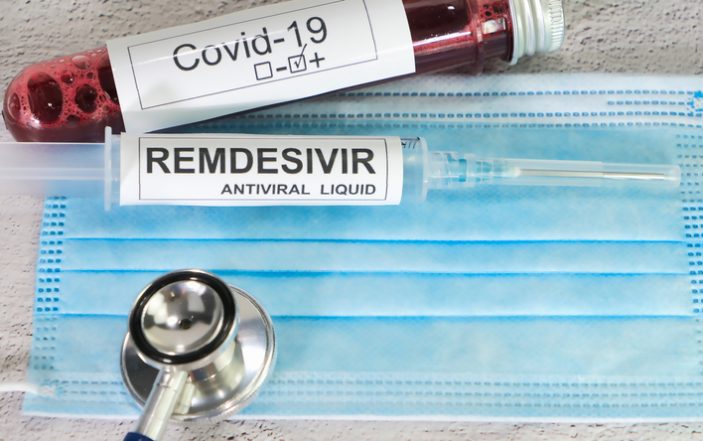Trials show encouraging results for early treatment of pandemic.
There has been a huge influx of new research for COVID-19, including possible treatment. To date, in vitro studies of remdesivir have demonstrated inhibition of SARS-CoV-2. Unfortunately, in vitro studies do not always extrapolate to clinical care or patient-oriented outcomes.
For the first trial, Grein et al [1], featured a case series of 53 patients receiving compassionate use remdesivir. The authors were looking for clinical improvement (live discharge from hospital + decrease of at least 2 points from baseline on a modified ordinal scale). Patients with an O2 saturation of ≤94% on room air or receiving oxygen support were enrolled.
About 75% of patients received a full 10-day course of remdesivir and patients were followed up for a median of 18 days. Of those patients, 68% had clinical improvement observed, 57% were extubated, 47% were discharged home and 13% died. This study had a number of limitations. Gilead, the maker of remdesivir, funded and wrote the article and there was no control group for comparison.
The second trial published on remdesivir by Wang et al [2] was a randomized, double-blind, placebo-controlled multicenter trial of 10 hospitals in China. In that trial, 237 patients were randomized to remdesivir vs. placebo with the primary outcome being median time to clinical improvement for up to 28 days. There was a non-statistically significant decrease in the primary outcome of 21d for remdesivir vs. 23d for placebo. Due to early termination, this trial was underpowered and did not show any statistically significant decrease in clinical outcomes. However, despite the lack of statistical significance there were trends toward shorter duration of illness and duration of mechanical ventilation (7.0 days vs. 5.5 days).
Another big piece of news was the ACTT-1 trial by Beigel JH et al [3]. This is the first part of a series of multicenter, phase 3, double-blind, placebo-controlled trials of IV remdesivir vs. placebo. Much like the previous trials, the authors were looking for the time to recovery based on an eight-category ordinal scale.
This study included just over 1,000 patients with a median of nine days from symptom onset to randomization. There was a four day decrease in median recovery time (11d remdesivir vs. 15d placebo) and a trend toward improved 14-day mortality (5.9% remdesivir vs. 10.4% placebo).
Like the Wang et al trial [2], this trial was also stopped early due to the results of an interim analysis. This meant only 65 to 70% of patients in both arms had completed the study at the time of this publication (i.e. we don’t have outcomes on the remaining patients, which could impact the final results).
The benefit of remdesivir was most apparent in patients with lesser severity of illness, but no real improvements were seen in patients who required noninvasive ventilation, high flow nasal canula or mechanically ventilated/on ECMO. While the trial was far from perfect, being in the middle of a pandemic with hospitals getting a surge of patients, even a four-day decrease in recovery time can have significant ramifications on a health system.
The third randomized clinical trial was by Goldman et al [4], which compared a 10-day course with a five-day course of remdesivir in patients hospitalized with COVID-19 that were not on mechanical ventilation. In this trial, 397 patients were randomized and began treatment. The authors were looking for clinical improvement of ≥2 points on the ordinal scale by 14 days. This was achieved in 54% of patients in the 10-day course and 64% in the five-day course of remdesivir.
Numerically it seemed that the five-day group fared better than the 10-day group and it appeared there were slightly more serious adverse events in the 10-day vs. five-day groups (i.e. decreased creatinine clearance and acute kidney injury). The lack of a placebo group is a big issue with this trial as we don’t know if clinical improvement would occur at the same rate in a disease that is self-limited (i.e. without placebo we cannot test the efficacy of remdesivir).
This trial demonstrated that a five-day course of remdesivir resulted in better clinical outcomes than a 10-day course in hospitalized patients with COVID-19 pneumonia, not on mechanical ventilation.
Due to the quick need for data, there has been a trend toward a decreased standard to publications at the moment. These articles are the best available options. There appear to be trends toward clinical improvement and maybe mortality benefit when remdesivir is given earlier in disease, but these trends don’t seem to be true in patients in the hyperinflammatory phase of disease. The best we can say at this time is remdesivir is looking like the Tamiflu of COVID-19 in that it may decrease duration of symptoms if given early enough in disease.
References:
- Grein J et al. Compassionate Use of Remdesivir for Patients with Severe COVID-19. NEJM 2020. PMID: 32275812
- Wang Y et al. Remdesivir in Adults with Severe COVID-19: A Randomised, Double-Blind, Placebo-Controlled, Multicentre Trial. Lancet 2020. PMID: 32423584
- Biegel JH et al. Remdesivir for the Treatment of COVID-19 – Preliminary Report. NEJM 2020. PMID: 32445440
- Goldman JD et al. Remdesivir for 5 or 10 Days in Patients with Severe COVID-19. NEJM 2020. [Epub Ahead of Print]



